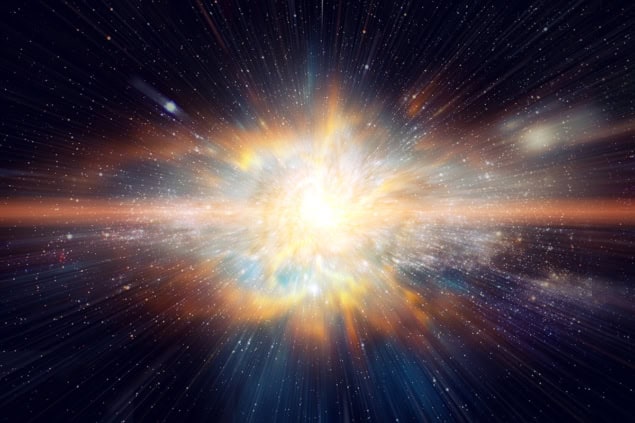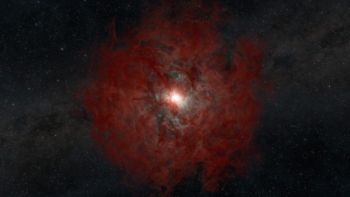Emma Chapman reviews Battle of the Big Bang: The New Tales of Our Cosmic Origins by Niayesh Afshordi and Phil Halper

“The universe began with a Big Bang.”
I’ve said this neat line more times than I can count at the start of a public lecture. It summarizes one of the most incomprehensible ideas in science: that the universe began in an extreme, hot, dense and compact state, before expanding and evolving into everything we now see around us. The certainty of the simple statement is reassuring, and it is an easy way of quickly setting the background to any story in astronomy.
But what if it isn’t just an oversimplified summary? What if it is misleading, perhaps even wholly inaccurate?
The Battle of the Big Bang: the New Tales of Our Cosmic Origin aims to dismantle the complacency many of us have fallen into when it comes to our knowledge of the earliest time. And it succeeds – if you push through the opening pages.
When a theory becomes so widely accepted that it is immune to question, we’ve moved from science supported by evidence to belief upheld by faith
Early on, authors Niayesh Afshordi and Phil Halper say “in some sense the theory of the Big Bang cannot be trusted”, which caused me to raise an eyebrow and wonder what I had let myself in for. After all, for many astronomers, myself included, the Big Bang is practically gospel. And therein lies the problem. When a theory becomes so widely accepted that it is immune to question, we’ve moved from science supported by evidence to belief upheld by faith.
It is easy to read the first few pages of The Battle of the Big Bang with deep scepticism but don’t worry, your eyebrows will eventually lower. That the universe has evolved from a “hot Big Bang” is not in doubt – observations such as the measurements of the cosmic microwave background leave no room for debate. But the idea that the universe “began” as a singularity – a region of space where the curvature of space–time becomes infinite – is another matter. The authors argue that no current theory can describe such a state, and there is no evidence to support it.
An astronomical crowbar
Given the confidence with which we teach it, many might have assumed the Big Bang theory beyond any serious questioning, thereby shutting the door on their own curiosity. Well, Afshordi and Halper have written the popular science equivalent of a crowbar, gently prising that door back open without judgement, keen only to share the adventure still to be had.
A cosmologist at the University of Waterloo, Canada, Afshordi is obsessed with finding observational ways of solving problems in fundamental physics, and is known for his creative alternative theories, such as a non-constant speed of light. Meanwhile Halper, a science popularizer, has carved out a niche by interviewing leading voices in early universe cosmology on YouTube, often facilitating fierce debates between competing thinkers. The result is a book that is both authoritative and accessible – and refreshingly free from ego.
Over 12 chapters, the book introduces more than two dozen alternatives to the Big Bang singularity, with names as tongue-twisting as the theories are mind-bending. For most readers, and even this astrophysicist, the distinctions between the theories quickly blur. But that’s part of the point. The focus isn’t on convincing you which model is correct, it’s about making clear that many alternatives exist that are all just as credible (give or take). Reading this book feels like walking through an art gallery with a knowledgeable and thoughtful friend explaining each work’s nuance. They offer their own opinions in hushed tones, but never suggest that their favourite should be yours too, or even that you should have a favourite.
If you do find yourself feeling dizzy reading about the details of holographic cosmology or eternal inflation, then it won’t be long before an insight into the nature of scientific debate or a crisp analogy brings you up for air. This is where the co-authorship begins to shine: Halper’s presence is felt in the moments when complicated theories are reduced to an idea anyone can relate to; while Afshordi brings deep expertise and an insider’s view of the cosmological community. These vivid and sometimes gossipy glimpses into the lives and rivalries of his colleagues paint a fascinating picture. It is a huge cast of characters – including Roger Penrose, Alan Guth and Hiranya Peiris – most of whom appear only for a page. But even though you won’t remember all the names, you are left with the feeling that Big Bang cosmology is a passionate, political and philosophical side of science very much still in motion.
Keep the door open
The real strength of this book is its humility and lack of defensiveness. As much as reading about the theory behind a multiverse is interesting, as a scientist, I’m always drawn to data. A theory that cannot be tested can feel unscientific, and the authors respect that instinct. Surprisingly, some of the most fantastical ideas, like pre-Big Bang cosmologies, are testable. But the tools required are almost science fiction themselves – such as a fleet of gravitational-wave detectors deployed in space. It’s no small task, and one of the most delightful moments in the book is a heartfelt thank you to taxpayers, for funding the kind of fundamental research that might one day get us to an answer.
In the concluding chapters, the authors pre-emptively respond to scepticism, giving real thought to discussing when thinking outside the box becomes going beyond science altogether. There are no final answers in this book, and it does not pretend to offer any. In fact, it actively asks the reader to recognize that certainty does not belong at the frontiers of science. Afshordi doesn’t mind if his own theories are proved wrong, the only terror for him is if people refuse to ask questions or pursue answers simply because the problem is seen as intractable.
Curiosity, unashamed and persistent, is far more scientific than shutting the door for fear of the uncertain
A book that leaves you feeling like you understand less about the universe than when you started it might sound like it has failed. But when that “understanding” was an illusion based on dogma, and a book manages to pry open a long-sealed door in your mind, that’s a success.
The Battle of the Big Bang offers both intellectual humility and a reviving invitation to remain eternally open-minded. It reminded me of how far I’d drifted from being one of the fearless schoolchildren who, after I declare with certainty that the universe began with a Big Bang, ask, “But what came before it?”. That curiosity, unashamed and persistent, is far more scientific than shutting the door for fear of the uncertain.
- May 2025 University of Chicago Press 360pp $32.50/£26.00 hb



